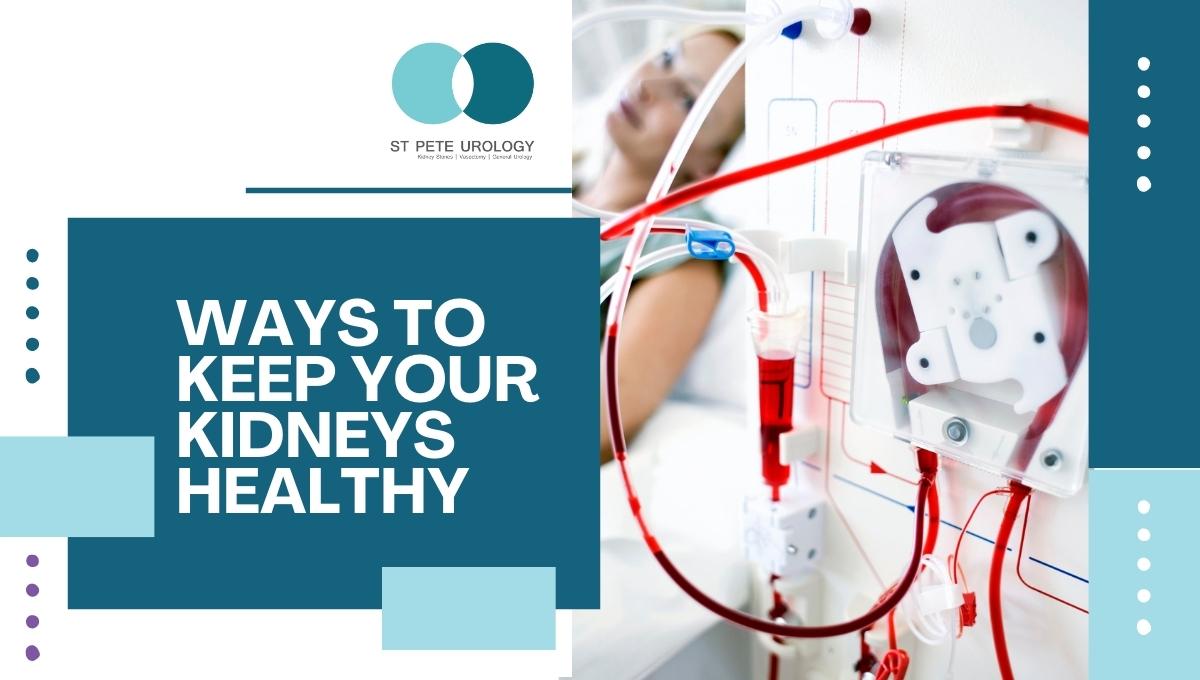

But your kidneys also regulate your blood pH, control body potassium levels, and produce hormones that control red blood cell production and blood pressure regulation. Plus, your kidneys activate a form of vitamin D that helps in absorption of calcium for regulating muscle function and building bones.
So it’s important to keep your kidneys healthy in order to filter and expel waste properly and to produce the necessary hormones for proper body function.
Here are 8 ways to keep your kidneys healthy
- Drink plenty of water
Drinking enough water regularly and consistently helps you stay hydrated. It also promotes waste removal in urine and ensures healthy kidneys.
Likewise, with more water intake, you’ll clear up sodium and toxins from your kidneys and reduce your risk of chronic kidney disease.
Although the amount of water you need depends on your lifestyle, overall health, climate, gender, exercise level and whether you’re pregnant or breastfeeding, you should aim for 1.5 to 2 liters of water per day.
And if you’ve previously had kidney stones, you need to drink even more water to prevent future stone formation.
- Eat a healthy diet and monitor your weight
For healthy kidneys, you need a balanced diet that is low in sodium, processed meats, and other kidney-damaging foods.
In fact, a focus on fresh ingredients with low sodium content, such as whole grains, fish, blueberries, and cauliflower will help reduce the risk of kidney disease.
Likewise, maintaining a healthy weight will help avoid issues such as heart disease and diabetes that can result in kidney damage. That’s because people who are obese or overweight have higher risk of kidney damage than the rest of the population.
- Maintain an active lifestyle and a physically fit body
Regular exercise helps to reduce the risk of chronic kidney disease. Plus, it lowers blood pressure and boosts heart health, both of which prevent kidney damage.
Whether you have a demanding daily routine or not, you can still find an activity that you enjoy and can do frequently. You can walk, run, cycle, or dance for 15-30 minutes every day for at least 3 days a week and help to keep your kidney healthy.
With exercise and physical fitness, the key is finding an activity that you can stick to, no matter how simple. In the long run, it will be good for your kidneys.
- Control your blood sugar level
Diabetes and other conditions characterized by high blood sugar may result in kidney damage. The consistently excess sugar in your blood will compel your kidneys to work extra hard to filter your blood, causing an exertion that can lead to life-threatening kidney damage.
So cut your daily sugar intake. Undergo regular blood sugar tests to monitor your sugar level. And if your sugar level is constantly high, follow the treatment regime prescribed by your doctor.
- Check your blood pressure
Having a normal blood pressure is good for your kidney. High blood pressure can cause kidney damage, especially if it occurs alongside other health issues like heart disease, high cholesterol, or diabetes.
A healthy blood pressure is 120/80 while pre-hypertension is 120/80 to 139/89. When your blood pressure is consistently above 140/90, you may have hypertension.
Make sure to check your blood pressure regularly. Speak with your doctor about a constantly elevated blood pressure and ask for advice on the dietary and lifestyle changes you need to make to lower it. Your doctor may also prescribe medication to help you manage your blood pressure.
- Avoid smoking
Smoking damages blood vessels and results in slower blood flow throughout your body and to your kidneys. In turn, this can cause kidney damage. Smoking also increases the risk of kidney cancer.
If you’re already smoking, you need to quit. If you find quitting difficult, seek for help. By quitting smoking, you improve your kidney health and reduce the risk of chronic health disorders.
- Minimize over-the-counter pills
Taking over-the-counter (OTC) medications regularly increases the risk of kidney damage.
For instance, non-steroidal anti-inflammatory drugs (NSAIDs), such ibuprofen and naproxen, may trigger kidney damage when taken regularly for arthritis, headaches, and chronic pain.
So if you have an issue that requires regular intake of pain-relieving and other medicines, you should speak with your doctor about kidney-safe options.
- Undergo kidney function tests
Early detection of kidney disease or damage helps to prevent further damage and complications. Hence, if you’re at high risk of kidney problems, it is prudent to have regular kidney function tests.
The tests will help indicate your current kidney health and reveal possible changes, helping you to take remedial measures to slow or prevent further damage.
You should undergo regular kidney testing if you:
- Are over 60 years or older
- Are obese
- Have a family history of high blood pressure
- Have cardiovascular disease
- Have family history of cardiovascular disease
- Believe that you have kidney damage
- Were born at a low birth weight
What health problems are commonly associated with kidneys?
More than 10-percent of Americans over the age of 20 years have some kind of kidney disease. Unfortunately, some forms of kidney issues are progressive, getting worse over time.
The most common kidney problems include:
- Urinary tract infections
This is a bacterial infection of any part of your urinary system, but most frequently in the urethra and bladder.
Most urinary tract infections are easily treatable and have few, long-term complications. But when untreated, the infections can spread to the kidneys and result in kidney failure.
- Kidney stones
When minerals and other substances in the blood reach high levels in urine, they may crystallize in the kidneys to form solid particles, called stones.
Passing the kidney stones can be extremely painful, but rarely cause significant problems.
- Glomerulonephritis
Glomerulonephritis is inflammation of the glomeruli—microscopic structures inside the kidneys that filter blood.
The inflammation can be due to infections, congenital abnormalities, drugs, and autoimmune diseases. Glomerulonephritis may heal without treatment, but may sometimes require medications.
- Polycystic kidney disease
This is a genetic disorder that leads to many cysts—round sacs of fluid—to develop inside and on the surfaces of the kidneys. The cysts interfere with kidney function and are usually a more serious medical problem.
- Chronic kidney disease
This is the most common kidney problem and often results in deteriorated kidney function, even to levels where they no longer properly perform their functions and may require dialysis.
Chronic kidney disease is majorly caused by high blood pressure and diabetes. With high blood pressure, the kidneys are forced to process at least 20-percent of the total volume of blood every minute.
As a result, there is increased blood on the glomeruli, which eventually damages the filtering apparatus and leads to a decline in function. With uncontrolled blood sugar due to diabetes, there is damage of the functional units of the kidney, resulting in kidney failure.
Enhancing kidney health
When your kidneys are unhealthy, they eventually reach a stage where they may no longer remove waste from blood, a condition called kidney failure. Also, the buildup of waste due to kidney malfunction can cause other serious problems, and ultimately result in death.
When your kidneys fail, your doctor may recommend that your blood be filtered artificially through dialysis. Alternatively, you may need to undergo a kidney transplant. Both options are demanding and costly, hence the need to maintain healthy kidneys so you don’t end up having to face these options.
At St Pete Urology, we encourage our patients to appreciate the vital role of their kidneys in their lives. We also promote deliberate actions that ensure healthy kidneys, including maintaining an active, health-conscious lifestyle.
If you’re looking for ideas on how to keep your kidneys healthy or are concerned about a bothersome issue you associate with your kidneys, visit us today for help.
During your visit, we will speak with you about the signs and symptoms of chronic health conditions that can increase your risk of kidney damage or disease. Plus, we will share ideas on keeping your kidneys and other vital organs healthy.
Come begin a close working relationship with a trustworthy, experienced urologist, which will help you prevent serious health issues in future. For more information on kidney problems and other urinary issues, visit the site “St Pete Urology.”

